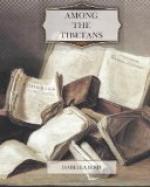I was heartily sorry to leave Leh, with its dazzling skies and abounding colour and movement, its stirring topics of talk, and the culture and exceeding kindness of the Moravian missionaries. Helpfulness was the rule. Gergan came over the Kharzong glacier on purpose to bring me a prayer-wheel; Lob-sang and Tse-ring-don-drub, the hospital assistants, made me a tent carpet of yak’s hair cloth, singing as they sewed; and Joldan helped to secure transport for the twenty-two days’ journey to Kylang. Leh has few of what Europeans regard as travelling necessaries. The brick tea which I purchased from a Lhassa trader was disgusting. I afterwards understood that blood is used in making up the blocks. The flour was gritty, and a leg of mutton turned out to be a limb of a goat of much experience. There were no straps, or leather to make them of, in the bazaar, and no buckles; and when the latter were provided by Mr. Redslob, the old man who came to sew them upon a warm rug which I had made for Gyalpo out of pieces of carpet and hair-cloth put them on wrongly three times, saying after each failure, ’I’m very foolish. Foreign ways are so wonderful!’ At times the Tibetans say, ’We’re as stupid as oxen,’ and I was inclined to think so, as I stood for two hours instructing the blacksmith about making shoes for Gyalpo, which kept turning out either too small for a mule or too big for a dray-horse.
I obtained two Lahul muleteers with four horses, quiet, obliging men, and two superb yaks, which were loaded with twelve days’ hay and barley for my horse. Provisions for the whole party for the same time had to be carried, for the route is over an uninhabited and arid desert. Not the least important part of my outfit was a letter from Mr. Redslob to the headman or chief of the Chang-pas or Champas, the nomadic tribes of Rupchu, to whose encampment I purposed to make a detour. These nomads had on two occasions borrowed money from the Moravian missionaries for the payment of the Kashmiri tribute, and had repaid it before it was due, showing much gratitude for the loans.
Dr. Marx accompanied me for the three first days. The few native Christians in Leh assembled in the gay garden plot of the lowly mission-house to shake hands and wish me a good journey, and not a few who were not Christians, some of them walking for the first hour beside our horses. The road from Leh descends to a rude wooden bridge over the Indus, a mighty stream even there, over blazing slopes of gravel dignified by colossal manis and chod-tens in long lines, built by the former kings of Ladak. On the other side of the river gravel slopes ascend towards red mountains 20,000 feet in height. Then comes a rocky spur crowned by the imposing castle of the Gyalpo, the son of the dethroned king of Ladak, surmounted by a forest of poles from which flutter yaks’ tails and long streamers inscribed with prayers. Others bear aloft the trident, the emblem of Siva.




